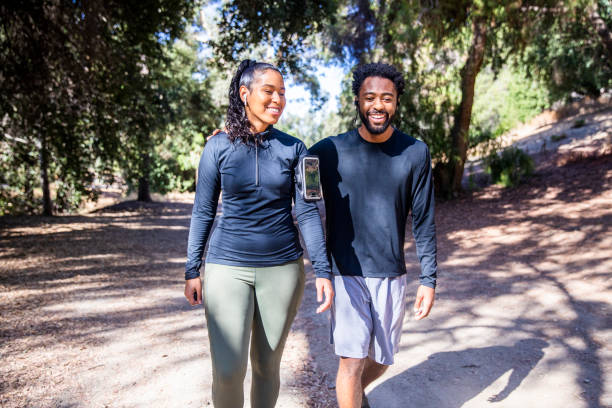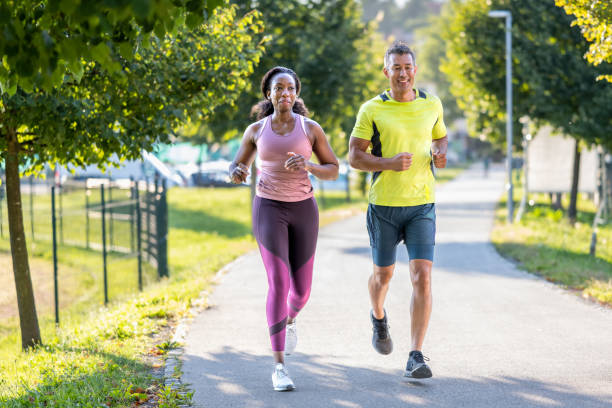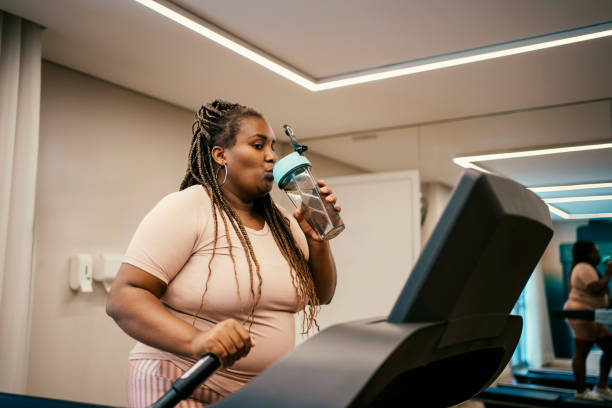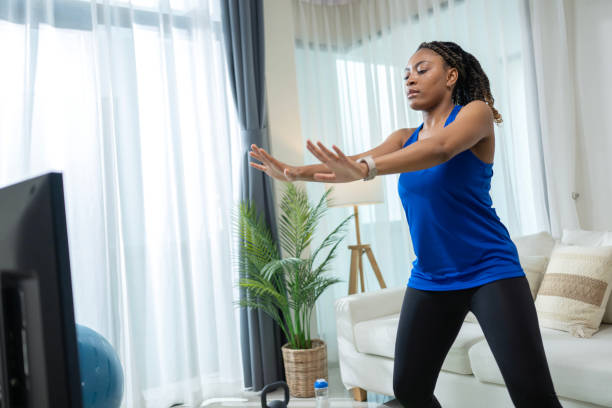(BlackFitness101.com) In conversations about fitness within the Black community, the focus is often placed on physical transformations—whether it’s gaining muscle, shedding weight, or enhancing cardiovascular health. But there’s another conversation we must have, and that’s the one about our mental health. The truth is, regular exercise doesn’t just transform your body—it can be a lifeline for your mind. As a Black fitness trainer with over 20 years of experience in training the body and educating the mind, I’ve seen firsthand how movement can shift our mental state, improve emotional resilience, and even act as a preventative tool against stress, anxiety, and depression.
For African Americans, who face a unique intersection of societal pressures, systemic inequality, generational trauma, and lack of access to adequate mental health resources, the gym, the track, or even the living room floor can become sacred ground. It’s time we talk openly about why exercise isn’t just a luxury—it’s a necessity.

1. The Mental Health Crisis in the Black Community
Before we talk about how exercise helps, let’s get honest about where we are. According to the Health and Human Services Office of Minority Health, African Americans are 20% more likely to experience serious psychological distress than white Americans. We are more likely to deal with chronic stress, trauma, and anxiety, yet we are far less likely to seek help due to stigma, cultural misunderstandings from healthcare providers, and barriers to access like cost and insurance.
Many of us were raised to “pray it away” or “suck it up” when it came to emotional struggles. Seeking therapy? That was seen as a sign of weakness. Talking about depression or panic attacks? Unheard of. But mental health is real, and it’s time we embrace all the tools at our disposal to fight back—and regular exercise is one of the most powerful tools we have.
2. How Exercise Physically Affects the Brain
Exercise boosts mental health on a chemical and structural level. When we engage in physical activity, the brain releases powerful neurotransmitters like:
- Endorphins: These are the body’s natural “feel good” chemicals. They reduce pain perception and trigger positive feelings.
- Serotonin: Often called the happiness hormone, this helps regulate mood, sleep, and appetite.
- Dopamine: This neurotransmitter plays a role in motivation, pleasure, and attention.
Regular movement also reduces the levels of the body’s stress hormone, cortisol, which, when chronically elevated, can lead to anxiety, weight gain, and sleep problems.
Over time, exercise has even been shown to physically change the brain. Aerobic activity helps grow the hippocampus—the part of the brain responsible for memory and emotion—and improves connections between brain cells. For people in high-stress environments or those battling depression, that’s not just helpful. That’s life-changing.
3. Reducing Anxiety and Depression Through Exercise
One of the most immediate mental health benefits of exercise is its impact on depression and anxiety. Countless studies have shown that regular aerobic exercise can be just as effective as antidepressants for mild to moderate depression. What makes this even more important for our community is the fact that many African Americans go undiagnosed or untreated.
In my years as a trainer, I’ve worked with clients who never even realized they were depressed until they started working out. Suddenly, they were sleeping better. They had more energy. They were smiling again, reconnecting with loved ones, and making plans for their future. That’s not a coincidence—it’s the power of exercise resetting the brain and reducing inflammation in the body and mind.
And when it comes to anxiety, movement can break the cycle of overthinking. Think about how many of us carry the weight of the world on our shoulders—dealing with microaggressions at work, worrying about raising Black children in a dangerous world, navigating relationships, and struggling with financial stress. A good sweat session gives us a release. It gets us out of our heads and into our bodies. That shift alone can make the difference between spiraling and surviving.
4. Exercise as a Coping Mechanism for Racial Trauma
Let’s be real—Black folks endure racial stress in ways many outside our community will never understand. Whether it’s overt racism, systemic oppression, or the psychological toll of watching people who look like us being harmed on the news, these experiences create what mental health experts call “racial trauma.”
That trauma doesn’t go away by ignoring it. But exercise can help process it.
Movement becomes protest. It becomes healing. It becomes an act of reclaiming our bodies from a society that often tries to control, define, or destroy them. Whether it’s a brisk walk through your neighborhood, a jog while listening to Black empowerment podcasts, or a weightlifting session with trap music blasting in your ears, exercise allows us to center ourselves and remind the world: “I’m still here.”
5. Boosting Self-Esteem and Body Confidence
In a culture that often tells us we’re not enough—too dark, too loud, too big, too broken—exercise can be the key to building ourselves back up from the inside out. When you train consistently, you’re not just sculpting muscles; you’re building discipline, confidence, and self-love.
I’ve had women in their 50s who thought they’d never feel sexy again start walking taller and wearing brighter colors. I’ve seen brothers battling obesity and depression drop 20 pounds and suddenly show up for life in ways they hadn’t in years. That’s not about aesthetics—it’s about reclaiming worth.
In the Black community, body image issues are often overlooked, but they’re real. Exercise helps us love our bodies not just for how they look, but for what they can do.
6. Building a Healthy Routine and Structure
One of the biggest challenges people face when struggling with mental health is a lack of structure. Depression makes it hard to get out of bed. Anxiety makes it hard to focus. Exercise gives you a framework. It creates habits. And in a chaotic world, those habits become anchors.
Creating a regular workout schedule—even if it’s just 30 minutes three times a week—provides a sense of control and purpose. It gives you something to look forward to, something to accomplish. Over time, that routine becomes a source of pride and stability.
For Black families, building that structure together is even more powerful. Imagine the generational healing that happens when parents model healthy habits for their kids—not just physical strength, but emotional resilience too.
7. Improving Sleep and Energy
Black Americans are statistically more likely to suffer from sleep disorders. From working multiple jobs to the constant mental stimulation of urban life and digital stress, we are often tired but wired. Poor sleep has a direct link to depression, anxiety, and chronic illness.
Exercise improves sleep by regulating your internal clock and promoting deeper rest. It reduces stress hormones and raises body temperature temporarily, which helps your body cool down and prepare for sleep afterward. Plus, when you’re physically tired (not just mentally exhausted), sleep comes easier and feels more restorative.
Better sleep means better energy, sharper focus, and more patience—things we all need to show up fully in our lives.
8. Creating Community and Connection
Isolation is one of the most dangerous aspects of poor mental health. Unfortunately, many of us suffer in silence. But movement doesn’t have to be a solo journey. In fact, some of the strongest mental health benefits come from exercising with others.
Joining a walking group, taking a Zumba class, or meeting up for weekend hikes creates bonds. It gives us a chance to laugh, talk, and hold each other accountable. In a world where genuine connection is hard to come by, the gym or the track can become our church, our therapy session, and our sanctuary.
Especially for Black men, who are often told to be stoic and silent, working out with other men can foster vulnerability in a safe, supportive space.
9. A Tool, Not a Cure: Pairing Exercise with Other Supports
Let me be clear—exercise is powerful, but it’s not a substitute for therapy, medication, or other forms of mental health treatment. It’s a tool in the toolbox, not the entire solution. But for many of us who don’t have access to therapy or are still working up the courage to go, exercise can be a bridge.
It can be the thing that makes therapy more effective. It can be the practice that helps you stay grounded between sessions. It can be the daily act of self-love that reminds you that healing is possible.
We need to break the idea that Black people can’t talk about therapy and wellness. We deserve peace. We deserve joy. And if a workout is the first step on that journey, then let’s take it.
10. Making It Work for You: Start Where You Are
You don’t need a fancy gym or a six-pack to start reaping the mental health benefits of exercise. Start where you are. Walk around the block. Do squats during commercial breaks. Dance in your kitchen. Move your body with intention, and your mind will follow.
I always say: progress, not perfection. Don’t wait for motivation—build discipline. Don’t wait until you “feel better”—move so that you can feel better. Your mental health is too important to leave on the back burner.
In the Black community, we are no strangers to struggle. But we are also no strangers to strength. And it’s time we use that strength—not just to survive, but to thrive. Regular exercise is more than a path to physical fitness. It is a radical act of self-care, a buffer against trauma, and a powerful tool for mental wellness.
As a trainer, a coach, and a Black man who’s walked through darkness myself, I want you to know that healing is possible. You are not weak for needing help. You are not broken. You are human. And movement is medicine.
Whether you’re lifting weights, walking through your neighborhood, dancing, or practicing yoga—every rep, every step, every breath is an investment in your peace.
So let’s reclaim our health—mind, body, and soul. One workout at a time.
Staff Writer; Leroy Smith
With over 20 years of experience in fitness and health education, I specialize in strengthening the body while empowering the mind. My mission is to uplift the Black community through movement, knowledge, and sustainable wellness. This is more than just workouts; it’s about reclaiming our health and redefining what strength truly means.
Questions? Feel free to email me at LSmith@BlackFitness101.com.











Leave a Reply